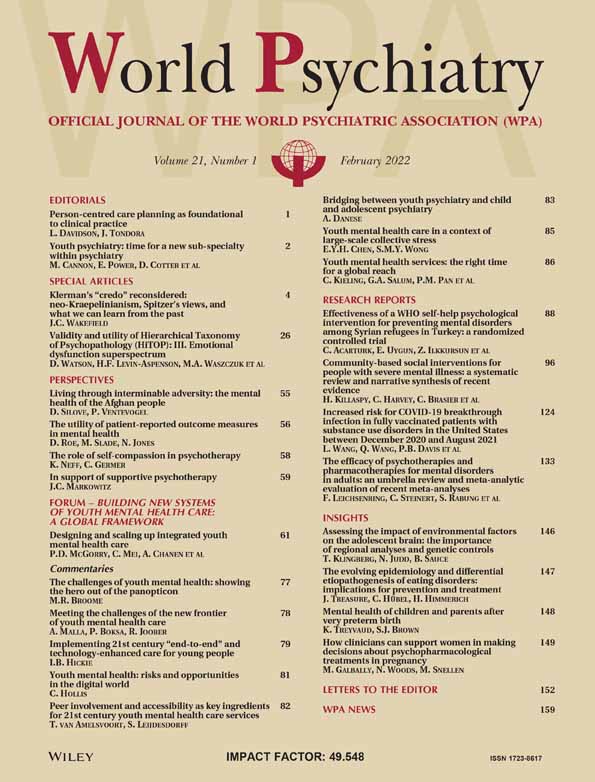Attention-deficit/hyperactivity disorder (ADHD) in adults: evidence base, uncertainties and controversies.
IF 65.8
1区 医学
Q1 Medicine
引用次数: 0
Abstract
Attention-deficit/hyperactivity disorder (ADHD) was once thought to be solely a childhood condition. Now it is well established that it can persist into adulthood, with an estimated worldwide prevalence of around 2.5%. Additionally, up to 70% of individuals with childhood-onset ADHD continue to experience impairing symptoms as adults, even if they no longer meet the criteria for a formal diagnosis. The validity of adult ADHD initially faced strong criticism. Today, empirical research supports its descriptive validity (identifying characteristic signs and symptoms), predictive validity (concerning specific outcomes, courses, and responses to treatment), and concurrent validity (evidence related to its underlying causes and biological mechanisms). Despite this progress, unresolved questions and ongoing debates about adult ADHD persist. This paper summarizes current empirical evidence, alongside uncertainties and controversies, regarding the definition, epidemiology, diagnosis, etiology, neurobiology, and management of ADHD in adults. Crucially, we also include perspectives from individuals with lived experience of this condition, highlighting their views on unmet needs and priorities for improving care. Key uncertainties and controversies on adult ADHD include: a) the possibility of late-onset ADHD; b) the significance of emotional dysregulation as a core symptom; c) the definition and characterization of functional impairment; d) the persistence of comorbid psychiatric and somatic conditions after accounting for confounders; e) the relevance of executive dysfunction in the definition of the condition; f) the use of objective diagnostic measures; g) the long-term effects of treatments; and h) the role of non-pharmacological interventions. Further research on adult ADHD is urgently needed. Funding for studies on this condition lags behind that for childhood ADHD and other mental disorders in adulthood. Hopefully, efforts by clinicians, researchers and other stakeholders will ultimately help ensure that adults with ADHD are better understood, supported, and empowered to thrive.成人注意力缺陷/多动障碍(ADHD):证据基础、不确定性和争议。
注意力缺陷/多动障碍(ADHD)曾经被认为仅仅是一种儿童疾病。现在已经确定,它可以持续到成年,估计全球患病率约为2.5%。此外,高达70%的儿童期ADHD患者成年后仍会出现损害症状,即使他们不再符合正式诊断的标准。成人多动症的有效性最初面临着强烈的批评。今天,实证研究支持其描述效度(识别特征体征和症状)、预测效度(关于具体结果、疗程和治疗反应)和并发效度(与其潜在原因和生物学机制相关的证据)。尽管取得了这些进展,关于成人多动症的悬而未决的问题和持续的争论仍然存在。本文总结了目前的经验证据,以及不确定性和争议,关于成人ADHD的定义,流行病学,诊断,病因学,神经生物学和管理。至关重要的是,我们还纳入了有这种疾病生活经验的个人的观点,突出了他们对未满足需求和改善护理重点的看法。成人ADHD的主要不确定性和争议包括:a)迟发性ADHD的可能性;B)情绪失调作为核心症状的意义;C)功能障碍的定义和特征;D)在考虑混杂因素后,精神疾病和躯体疾病并存的持续性;E)执行功能障碍与疾病定义的相关性;F)使用客观诊断措施;G)治疗的长期效果;h)非药物干预的作用。成人ADHD的进一步研究是迫切需要的。对这种情况的研究资金落后于对儿童多动症和成年后其他精神障碍的研究。希望临床医生、研究人员和其他利益相关者的努力最终能帮助确保患有多动症的成年人得到更好的理解、支持,并有能力茁壮成长。
本文章由计算机程序翻译,如有差异,请以英文原文为准。
求助全文
约1分钟内获得全文
求助全文
来源期刊

World Psychiatry
Nursing-Psychiatric Mental Health
CiteScore
64.10
自引率
7.40%
发文量
124
期刊介绍:
World Psychiatry is the official journal of the World Psychiatric Association. It aims to disseminate information on significant clinical, service, and research developments in the mental health field.
World Psychiatry is published three times per year and is sent free of charge to psychiatrists.The recipient psychiatrists' names and addresses are provided by WPA member societies and sections.The language used in the journal is designed to be understandable by the majority of mental health professionals worldwide.
 求助内容:
求助内容: 应助结果提醒方式:
应助结果提醒方式:


